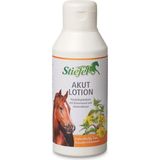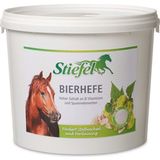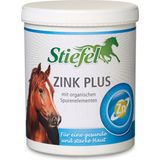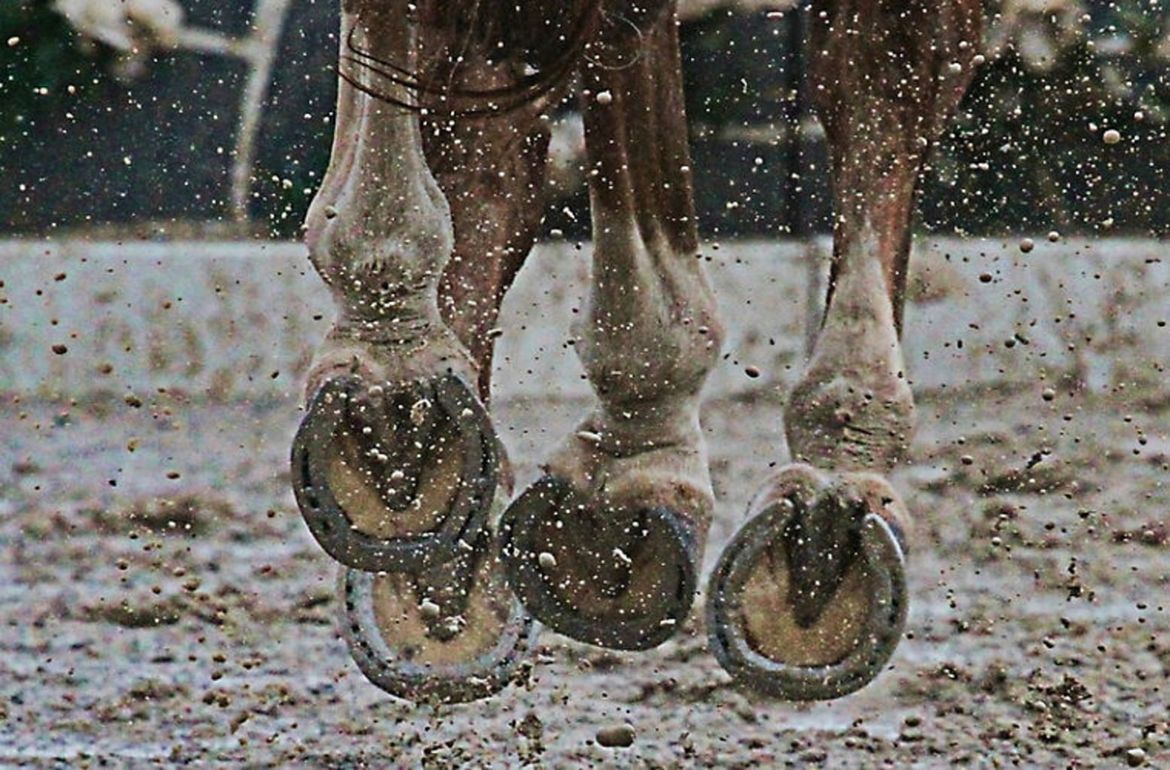Malaise
What is Malaise?
Malaise is an inflammation of the skin in the fetlock of the horse. It occurs mainly on the hindquarters and more often in horses with a long coat.
Dirt and moisture often collect in the crook of the fetlock, which is an ideal breeding ground for bacteria, fungi and viruses. If the skin is not immune to strong defenses, the germs can penetrate the skin and spread there. The skin is irritated and becomes inflamed as it progresses.
The dry form of Malaise can be recognized by the appearance of scaly spots in the fetlock. With the damp form, secretion escapes from a wound and a thick crust forms.
Malaise can develop into a chronic disease very quickly. It is therefore important to intervene as early as possible and support the horse. This not only includes treating the affected areas of the skin from the outside. The problem should be approached holistically - also from the inside.
What are the causes of Malaise?
The cause of Malaise is usually a weakened or defective skin. Germs, bacteria, mites, fungi etc. are everywhere, they cannot be avoided. But if the skin is not immune enough, germs can penetrate the skin and cause inflammation.
The skin is the horse's largest organ and functions mainly as a defense organ, which is supposed to protect the body from harmful external influences.
Malaise occurs mostly in the wet and cold season. That means, always in the times after the coat change, when the horse's immune system has to face enormous challenges anyway. If the immune system is overwhelmed or weakened, the skin is often also weakened. The skin is heavily stressed during the period of coat change. A lot of zinc and B vitamins are consumed in the process. In the time of the coat change, there is also the weather change, which again presents challenges for the immune system. The climate is becoming more humid, the soil more muddy. The horses' fetlocks often do not get any rest and constantly come into contact with damp dirt.
Wetness, warmth and mud create an optimal environment for the unwanted roommates. The skin is also softened by the moisture and at some point has no more strength to defend itself. The structure of the skin becomes porous, the skin cells lose their elasticity and become cracked, and the production of new cells is slowed down. Germs can now easily penetrate the skin, where they can do mischief and multiply.
HYGIENE
It is important to put a horse affected by Malaise on dry ground. The coat should be shortened if possible so that the germs are deprived of their habitat and the affected areas can rest and start to recover.
We recommend cleaning the affected areas with a mild care product - such as the Stiefel Top Wash Shampoo - and then drying them gently. However, you shouldn't wash the areas too often, as washing and rubbing can also irritate the skin.
As a preventive measure, you should ensure that the endangered areas such as the fetlocks are kept clean, dry and free of crust.
MAINTENANCE
Wet, softened skin as well as dry, cracked skin is a deficit.
Therefore, the skin should be gently cared for so that it is supple.
The Stiefel Akut Lotion is a skin care balm with nettle and St. John's wort and is ideally suited for Malaise treatment, as it has a protective and nourishing aspect.
St. John's Wort and coconut oil can have an antiseptic effect and at the same time keep the skin supple thanks to the oil content, in order to prevent further damage. The nettle it contains can accelerate the healing process thanks to its properties that promote blood circulation. The protective and revitalising active ingredients can ensure rapid regeneration of the skin and promote wound closure and the regeneration of tissue. The balm is massaged in and penetrates quickly and without residue into the skin and allows it to continue breathing, which is also important for the healing process.
FEEDING
A horse that is plagued by Malaise has an increased need for vitamins and zinc. You should therefore feed the trace elements and vitamins that are important for healthy skin.
In this way, the depots can be replenished and the skin strengthened from the inside. Zinc and B-vitamin-rich Stiefel Diatomaceous Earth is fed as a cure to compensate for deficiencies. It also ensures water balance in the cells and drives the cell metabolism. Pollutants are removed more quickly; the skin is "cleaned". The 100% pure brewer's yeast from Stiefel is also a treasure trove of B vitamins. In addition, Stiefel black seed oil can have a positive effect on the immune system and skin functions.
In addition, it should be noted that feed that is too high in energy can strain the colon and impair metabolic processes. In a horse affected by Malaise, you should usually take care to relieve the metabolism with grain-free concentrated feed.
With sensitive horses it makes sense to support the supply of minerals during the coat change so that the skin structure is not weakened in the first place. Feeding Zinc Plus or, alternatively, Diatomaceous Earth, is suitable for this.
Please note that it is always sensible to consult a vet before and during any treatment program.
Stiefel Acute Lotion
Protects sensitive and damaged skin areas with natural herbal extracts. Mild ingredients have a positive effect on wounds, eczema and extensive skin irritation. The balm has a nourishing effect and promotes the suppleness of the skin - for example in the ankle area of Malaise patients. With strong, healthy skin, mites, fungi and parasites cannot penetrate in the first place. Stiefel Acute Lotion can accelerate the skin's natural healing process and support the skin's resistance to the penetration of external germs. With clove, nettle, coconut, St. John's wort.
Stiefel Zinc Plus
Zinc is one of the essential trace elements. Especially in the period when the coat changes, the body has an increased need for zinc in order to form the new coat. Unfortunately, zinc can only be stored in small quantities in the body and should therefore be supplied regularly with the feed. Stiefel Zink Plus is ideally suited to compensate for the increased need for zinc during the coat change period.
In addition to zinc, it also contains other trace elements in an optimally balanced ratio. All trace elements are organically bound and are therefore optimally used by the body.
Oils
Oils are rich in essential fatty acids and vitamins and have a strengthening effect on the horse's body when the coat changes. At the same time they are a very good supplier of energy in times of increased metabolism. The Stiefel linseed oil is particularly rich in omega-3 fatty acids, vitamin A, vitamin E and vitamin D. The Stiefel hemp oil contains valuable omega-3, omega-6 and omega-9 fatty acids in an ideal ratio for the horse. The Stiefel black seed oil also has a stimulating effect on the immune system.
Stiefel brewer's yeast
Stiefel brewer's yeast is the all-rounder. It strengthens the horse's natural intestinal flora, increases the digestibility of roughage and thus ensures better absorption of various substances. It is naturally very rich in B vitamins, omega-3 fatty acids and zinc, among other things. Vitamin B is a very important skin vitamin that is needed for the reproduction of skin cells.
Related products
-
 5.0 (3)
5.0 (3)Stiefel Acute Lotion, 250 ml
- Suitable for allergic horses
- Quickly absorbed
- Does not leave behind any residues
£21.38 (£85.52 / l)Delivery by December 22
-
 4.9 (11)
4.9 (11)Stiefel Brewer's Yeast, 3 kg
Bestseller- Valuable composition of vitamins and trace elements
- Can support digestion and metabolism
- For feeding during the coat change and at the start of the grazing season
£17.80 (£5.93 / kg)Delivery by December 22
-
 4.9 (11)
4.9 (11)Stiefel Zinc Plus, 900 g
Bestseller- For healthy and strong skin
- Good for the immune system
- With organic trace elements
£17.80 (£19.78 / kg)Delivery by December 22
-
Great Britain: Free standard delivery from £79.90
-
Free
returns Secure payments
with SSL encryption technology

